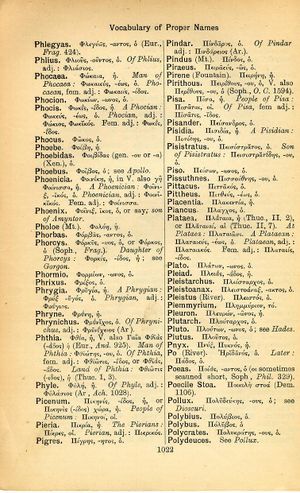Pluto: Difference between revisions
ὁ λόγος τοῦ Θεοῦ οὐ δέδεται → the word of God will not be dishonoured, the word of God will not be dishonored
m (Text replacement - "}}]]" to "}}]]") |
m (Text replacement - "(|thumb)\n(\|link=)" to "$1$2") |
||
| Line 1: | Line 1: | ||
{{WoodhouseENELnames | {{WoodhouseENELnames | ||
|Text=[[File:woodhouse_1022.jpg|thumb | |Text=[[File:woodhouse_1022.jpg|thumb|link={{filepath:woodhouse_1022.jpg}}]][[Πλούτων]], -ωνος, ὁ; see [[Hades]]. | ||
|link={{filepath:woodhouse_1022.jpg}}]][[Πλούτων]], -ωνος, ὁ; see [[Hades]]. | |||
}} | }} | ||
{{Lewis | {{Lewis | ||
Revision as of 16:55, 18 May 2020
English > Greek (Woodhouse)
Latin > English (Lewis & Short)
Plūto: or Plūton, ōnis, m., = Πλούτων,
I the king of the Lower World, the husband of Proserpine, and brother of Jupiter and Neptune, Cic. N. D. 2, 26, 66; Hyg. praef.; Verg. A. 7, 327; Juv. 13, 50.—Acc. Gr. Plutona, Hor. C. 2, 14, 7.—Hence,
II Plūtōnĭus, a, um, adj., of or belonging to Pluto, Plutonian: et domus exilis Plutonia, i. e. the realms. of death, the Lower Regions, Hor. C. 1, 4, 17.—Subst.: Plūtō-nĭa, ōrum, n. plur., a pestilential district in Asia, Cic. Div. 1, 36, 79.
Latin > French (Gaffiot 2016)
Plūtō (-tōn), ōnis, m. (Πλούτων), Pluton [fils de Saturne et d’Ops, frère de Jupiter et de Neptune, dieu des enfers] : Cic. Nat. 2, 66 ; Virg. En. 7, 327 || -tōnĭus, a, um, de Pluton : Hor. O. 1, 4, 17 || -tōnĭa, ōrum, n., région empestée de l’Asie : Cic. Div. 1, 79.
Latin > German (Georges)
Plūto u. Plūtōn, ōnis, m. (Πλούτων), der König der Unterwelt, Gemahl der Proserpina, Bruder Jupiters u. Neptuns, Form Pluto, Hyg. fab. praef. p. 8. M. Mythogr. Lat. 1, 108; 2, 10; 3, 6, 1: Form Pluton, Enn. bei Lact. 1, 14, 5 ed. Buenem. (Vahlen Enn. fr. var. 77 Pluto). Verg. Aen. 7, 327. Iuven. 13, 50. Claud. rapt. Pros. 1, 276; vgl. Plin. bei Charis. 118, 24: griech. Akk. Plutona, Hor. carm. 2, 14, 7. – Dav. Plūtōnius, a, um, zu Pluto gehörig, plutonisch, domus, das Grab, Hor.: coniunx, Proserpina, Prud. – Plur. subst., Plūtōnia, iōrum, n. (sc. loca), eine Gegend in Asien, viell. in Lydien, wo nach Strabo ein Tempel des Pluto war, Cic. de div. 1, 79.

